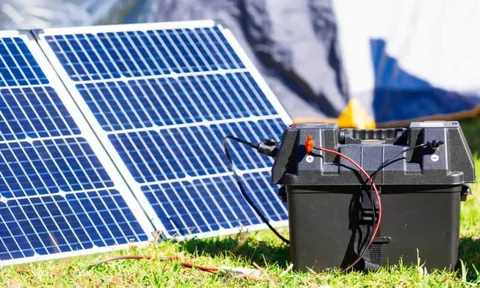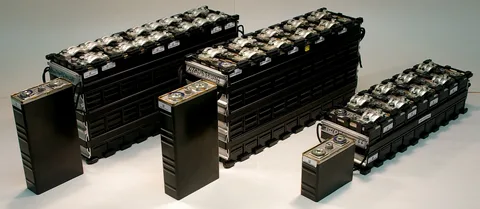Solar power systems are rapidly gaining popularity in the world of renewable energy as a sustainable and efficient energy source. Central to their enhanced performance are Lithium-Ion Solar Batteries. These batteries have revolutionised the way solar power is stored and utilised, offering numerous benefits that make them ideal for both residential and commercial applications. From superior energy efficiency to advanced safety features, lithium ion solar batteries are an integral component in the evolution of solar power systems.
Superior Energy Efficiency and Storage Capacity
Lithium-ion solar Batteries offer exceptional energy density, allowing them to store more power in a compact form. This makes them ideal for solar power systems where space and weight constraints exist. Their efficient energy storage and release capabilities minimise wastage, enhancing overall system performance. This ensures that energy demands are consistently met, making these batteries highly effective for residential and commercial applications.
The high energy efficiency of Lithium-Ion batteries translates to a better return on investment for solar power systems. These batteries ensure less energy is wasted by maximising the amount of solar energy captured and utilised. In practical terms, households can rely on stored energy during peak hours when electricity rates are higher, effectively reducing utility bills. Additionally, businesses can use stored energy to power operations during non-sunny hours, contributing to overall operational efficiency and sustainability.
Furthermore, Lithium-Ion Solar Batteries can adapt to different energy needs. Advanced battery management systems allow users to monitor energy usage in real-time, making it easier to optimise consumption patterns. This flexibility means that as households or businesses grow and their energy requirements change, Lithium-Ion batteries can adjust accordingly, ensuring continuous efficiency and effectiveness. Ultimately, these batteries’ superior energy efficiency and storage capacity make them a cornerstone of modern solar power systems.
Longevity and Durability for Extended Use
Lithium-ion solar Batteries stand out for their extended lifespan and robustness. They can endure numerous charge and discharge cycles without significant performance loss, which minimises the need for frequent replacements. This longevity translates into reduced maintenance costs and consistent reliability over time. Their resilience to overcharging and deep discharging further enhances their durability, making them a dependable choice for solar power systems in various settings.
One of the most compelling advantages of Lithium-Ion technology is its ability to sustain high performance even after many years of use. While traditional lead-acid batteries may degrade significantly within a few years, Lithium-Ion batteries often retain a substantial portion of their original capacity, allowing users to benefit from prolonged energy storage capabilities. This resilience is particularly beneficial in regions with high solar energy potential, where consistent energy storage is paramount.
Moreover, the construction of Lithium-Ion batteries involves advanced materials that contribute to their durability. Innovations in battery design, such as better electrolyte formulations and improved cell architectures, have led to batteries that can withstand environmental stresses like humidity and temperature fluctuations. As a result, these batteries perform consistently well, whether installed in residential settings or commercial solar farms. By investing in Lithium-Ion Solar Batteries, users can enjoy peace of mind, knowing they are equipped with a reliable and long-lasting energy storage solution.
Enhanced Performance in Diverse Weather Conditions
Varying weather conditions can impact the efficiency of solar power systems. Lithium-ion solar Batteries are engineered to maintain optimal performance across a broad temperature range, from cold winters to scorching summers. This capability ensures consistent energy output, regardless of external weather fluctuations. Their robust design allows them to operate reliably in hot and cold environments, making them suitable for diverse climates. Consequently, solar power systems equipped with these batteries can deliver steady and dependable energy year-round, ensuring that energy needs are met even in less-than-ideal weather conditions.
Weather-related challenges, such as storms, snow, or extreme heat, can significantly affect the performance of solar panels. However, with Lithium-Ion Solar Batteries, users can have confidence in their ability to store energy even during adverse weather conditions. For instance, in snowy regions where solar panels may be covered, these batteries can still utilise energy from previous sunny days, ensuring households and businesses remain powered. Similarly, the batteries’ thermal management systems prevent overheating in areas with high temperatures, ensuring longevity and efficiency.
Benefits of Off Grid Solar Batteries
Off grid solar batteries are an excellent choice for those looking to achieve grid independence due to their high efficiency and reliability. These batteries store energy generated by solar panels when sunlight is unavailable, ensuring a steady power supply. Additionally, they are invaluable during power outages, providing essential energy in remote locations. Their superior storage capacity and longevity make them ideal for sustaining off-grid systems, promoting a more self-sufficient and sustainable lifestyle.
Off-grid Solar Batteries excel in off-grid scenarios where access to traditional power sources is limited or nonexistent. They allow users to harness renewable energy efficiently, storing it during peak consumption times or cloudy days. This independence from the grid reduces reliance on fossil fuels and lowers electricity costs, making solar power an economically viable option for many. Furthermore, off-grid living encourages environmentally conscious practices, fostering a sustainable lifestyle.
Moreover, these batteries’ versatility means they can support various applications, from powering homes to providing energy for agricultural operations or recreational vehicles. This flexibility makes ff-grid Solar Batteries preferred for individuals and businesses seeking reliable energy solutions in remote areas.
Advanced Safety Features and Technological Innovations
Lithium-ion solar Batteries have sophisticated safety mechanisms that address common concerns like overheating, overcharging, and short-circuiting. These batteries feature built-in protection systems to shut down or regulate power flow when detecting anomalies automatically. Recent technological advancements have further improved their performance, such as improved thermal management and enhanced battery monitoring systems. These enhancements not only increase the safety of the batteries but also optimise their efficiency and reliability.
Through continuous research and development, manufacturers integrate state-of-the-art materials and designs, ensuring that Lithium-Ion Solar Batteries remain at the forefront of safe and efficient energy storage solutions. In addition to built-in protection mechanisms, many lithium-ion solar batteries have intelligent monitoring systems that allow users to track real-time performance metrics. These systems provide insights into energy usage patterns, battery health, and charging cycles, empowering users to make informed decisions about their energy management.
 Cost-Effectiveness and Financial Incentives
Cost-Effectiveness and Financial Incentives
While the initial investment in Lithium-Ion Solar Batteries may be higher than other options, their long-term savings make them a wise choice. With their extended lifespan and minimal maintenance requirements, these batteries reduce overall costs significantly over time. Additionally, various financial incentives and rebates are often available to help offset the initial expenses.
These incentives make the transition to renewable energy more affordable and appealing, encouraging more individuals and businesses to adopt sustainable practices. The combination of reduced long-term costs and financial incentives makes Lithium-Ion Solar Batteries an attractive option for those looking to invest in renewable energy solutions.
Investing in Lithium-Ion Solar Batteries is not just about immediate costs but also long-term financial benefits. Over the years, as electricity prices continue to rise, having a solar power system with Lithium-Ion storage can protect users from escalating utility costs. By storing solar energy for later use, consumers can significantly reduce their dependence on the grid, lowering electricity bills. Additionally, these batteries typically require minimal maintenance, further reducing ongoing costs.
Scalability for Growing Energy Needs
As energy demands increase, the scalability of Lithium-Ion Solar Batteries allows seamless expansion of solar power systems. This flexibility is especially beneficial for businesses or households anticipating growth, enabling the addition of more batteries without a complete system overhaul.
Their modular design ensures that the system can efficiently adapt to varying energy requirements. This adaptability is crucial for maintaining optimal performance as energy needs evolve, making Lithium-Ion Solar Batteries a future-proof solution for residential and commercial applications. The ease of integration and expansion underscores their role in meeting growing energy demands sustainably.
Families may start with a minor solar power system in residential settings and gradually expand it as their energy needs increase. This scalability means that homeowners can invest in Lithium-Ion batteries, knowing they can add more capacity later without replacing existing components. For businesses, this flexibility allows for strategic energy planning, ensuring that their solar power systems can keep pace with operational growth.
Off Grid Batteries for Solar
Off grid batteries for solar rely heavily on batteries to store energy when sunlight is unavailable. Choosing the correct battery is crucial for ensuring that these systems operate efficiently and meet the energy demands of users. Here are the key considerations and benefits of off-grid batteries for solar energy systems:
Energy Storage Capacity
- Definition and Importance: Energy storage capacity refers to the amount of energy a battery can store, typically measured in kilowatt-hours (kWh). This is crucial for ensuring a steady energy supply when sunlight is unavailable.
- Sizing the System: Proper sizing of the battery bank is essential to accommodate daily energy usage and any potential future increases in demand. Users need to assess their energy consumption patterns to determine the appropriate capacity.
Longevity and Cycle Life
-
- Cycle Life Explained: The cycle life of a battery indicates how many charge and discharge cycles it can undergo before its capacity significantly diminishes.
- Impact on Cost: Batteries with longer cycle lives provide better long-term savings, as users will need to replace them less frequently. Lithium-ion batteries typically have a cycle life of 3,000 to 5,000 cycles, whereas lead-acid batteries may only last 500 to 1,500 cycles.
Efficiency
-
- Round-Trip Efficiency: This metric measures how much energy can be used from the battery compared to how much was initially stored. Lithium-ion batteries can achieve up to 95% efficiency, while lead-acid batteries generally have around 80% efficiency.
- Energy Loss Considerations: Higher efficiency reduces energy loss during storage and retrieval, making lithium-ion batteries more cost-effective in the long run.
Conclusion
Lithium ion solar batteries have significantly advanced the performance and reliability of solar power systems. Their efficient energy storage, extended lifespan, and ability to function in diverse weather conditions make them ideal for various applications. These batteries also offer scalability, allowing for easy system expansion as energy needs grow. Enhanced safety features and ongoing technological innovations further solidify their position as a leading choice for renewable energy storage. Combining these attributes ensures that Lithium-Ion Solar Batteries provide a robust, adaptable, and efficient solution for harnessing solar power.
FAQS
How Long Do Lithium Ion Solar Batteries Last?
Lithium-ion solar batteries can last 10 to 15 years, contingent upon proper usage and maintenance. Their extended longevity is attributed to their ability to endure numerous charge and discharge cycles without substantial degradation.
Are Lithium-Ion Solar Batteries Safe?
They are designed with sophisticated safety mechanisms that protect against overheating, overcharging, and short-circuiting. These features make them a reliable and safe option for solar power systems.
Can I Use Lithium-Ion Solar Batteries for an Off-Grid System?
Absolutely. Their high efficiency and reliability make Lithium-Ion Solar Batteries well-suited for off-grid systems. They effectively store energy generated by solar panels, ensuring a consistent power supply even during periods without sunlight.
| Other Good Articles to Read |
| Niche Blogs Connect |
| Blogs 97 |
| Blog Stitution |
| Blogs Unplugged |
| Blogs Cotch Rouge |
| Blog Signatr |
| Blog Sintonias |
| Blog Zilla |
| Consumer Forums |
| Finance Forums |
| G Blogs |
| Too Blog |
| Related Business Listings |
| Contact Directory |
| Local Business Profiles |



